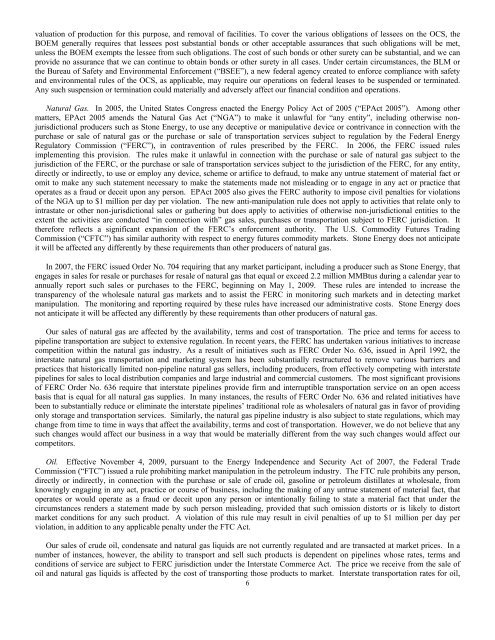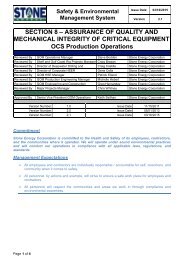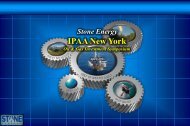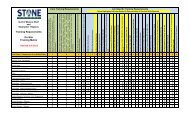2012 Annual Report - Stone Energy Corporation
2012 Annual Report - Stone Energy Corporation
2012 Annual Report - Stone Energy Corporation
You also want an ePaper? Increase the reach of your titles
YUMPU automatically turns print PDFs into web optimized ePapers that Google loves.
valuation of production for this purpose, and removal of facilities. To cover the various obligations of lessees on the OCS, theBOEM generally requires that lessees post substantial bonds or other acceptable assurances that such obligations will be met,unless the BOEM exempts the lessee from such obligations. The cost of such bonds or other surety can be substantial, and we canprovide no assurance that we can continue to obtain bonds or other surety in all cases. Under certain circumstances, the BLM orthe Bureau of Safety and Environmental Enforcement (“BSEE”), a new federal agency created to enforce compliance with safetyand environmental rules of the OCS, as applicable, may require our operations on federal leases to be suspended or terminated.Any such suspension or termination could materially and adversely affect our financial condition and operations.Natural Gas. In 2005, the United States Congress enacted the <strong>Energy</strong> Policy Act of 2005 (“EPAct 2005”). Among othermatters, EPAct 2005 amends the Natural Gas Act (“NGA”) to make it unlawful for “any entity”, including otherwise nonjurisdictionalproducers such as <strong>Stone</strong> <strong>Energy</strong>, to use any deceptive or manipulative device or contrivance in connection with thepurchase or sale of natural gas or the purchase or sale of transportation services subject to regulation by the Federal <strong>Energy</strong>Regulatory Commission (“FERC”), in contravention of rules prescribed by the FERC. In 2006, the FERC issued rulesimplementing this provision. The rules make it unlawful in connection with the purchase or sale of natural gas subject to thejurisdiction of the FERC, or the purchase or sale of transportation services subject to the jurisdiction of the FERC, for any entity,directly or indirectly, to use or employ any device, scheme or artifice to defraud, to make any untrue statement of material fact oromit to make any such statement necessary to make the statements made not misleading or to engage in any act or practice thatoperates as a fraud or deceit upon any person. EPAct 2005 also gives the FERC authority to impose civil penalties for violationsof the NGA up to $1 million per day per violation. The new anti-manipulation rule does not apply to activities that relate only tointrastate or other non-jurisdictional sales or gathering but does apply to activities of otherwise non-jurisdictional entities to theextent the activities are conducted “in connection with” gas sales, purchases or transportation subject to FERC jurisdiction. Ittherefore reflects a significant expansion of the FERC’s enforcement authority. The U.S. Commodity Futures TradingCommission (“CFTC”) has similar authority with respect to energy futures commodity markets. <strong>Stone</strong> <strong>Energy</strong> does not anticipateit will be affected any differently by these requirements than other producers of natural gas.In 2007, the FERC issued Order No. 704 requiring that any market participant, including a producer such as <strong>Stone</strong> <strong>Energy</strong>, thatengages in sales for resale or purchases for resale of natural gas that equal or exceed 2.2 million MMBtus during a calendar year toannually report such sales or purchases to the FERC, beginning on May 1, 2009. These rules are intended to increase thetransparency of the wholesale natural gas markets and to assist the FERC in monitoring such markets and in detecting marketmanipulation. The monitoring and reporting required by these rules have increased our administrative costs. <strong>Stone</strong> <strong>Energy</strong> doesnot anticipate it will be affected any differently by these requirements than other producers of natural gas.Our sales of natural gas are affected by the availability, terms and cost of transportation. The price and terms for access topipeline transportation are subject to extensive regulation. In recent years, the FERC has undertaken various initiatives to increasecompetition within the natural gas industry. As a result of initiatives such as FERC Order No. 636, issued in April 1992, theinterstate natural gas transportation and marketing system has been substantially restructured to remove various barriers andpractices that historically limited non-pipeline natural gas sellers, including producers, from effectively competing with interstatepipelines for sales to local distribution companies and large industrial and commercial customers. The most significant provisionsof FERC Order No. 636 require that interstate pipelines provide firm and interruptible transportation service on an open accessbasis that is equal for all natural gas supplies. In many instances, the results of FERC Order No. 636 and related initiatives havebeen to substantially reduce or eliminate the interstate pipelines’ traditional role as wholesalers of natural gas in favor of providingonly storage and transportation services. Similarly, the natural gas pipeline industry is also subject to state regulations, which maychange from time to time in ways that affect the availability, terms and cost of transportation. However, we do not believe that anysuch changes would affect our business in a way that would be materially different from the way such changes would affect ourcompetitors.Oil. Effective November 4, 2009, pursuant to the <strong>Energy</strong> Independence and Security Act of 2007, the Federal TradeCommission (“FTC”) issued a rule prohibiting market manipulation in the petroleum industry. The FTC rule prohibits any person,directly or indirectly, in connection with the purchase or sale of crude oil, gasoline or petroleum distillates at wholesale, fromknowingly engaging in any act, practice or course of business, including the making of any untrue statement of material fact, thatoperates or would operate as a fraud or deceit upon any person or intentionally failing to state a material fact that under thecircumstances renders a statement made by such person misleading, provided that such omission distorts or is likely to distortmarket conditions for any such product. A violation of this rule may result in civil penalties of up to $1 million per day perviolation, in addition to any applicable penalty under the FTC Act.Our sales of crude oil, condensate and natural gas liquids are not currently regulated and are transacted at market prices. In anumber of instances, however, the ability to transport and sell such products is dependent on pipelines whose rates, terms andconditions of service are subject to FERC jurisdiction under the Interstate Commerce Act. The price we receive from the sale ofoil and natural gas liquids is affected by the cost of transporting those products to market. Interstate transportation rates for oil,6









